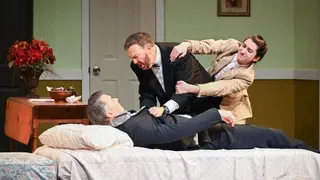May 23, 2014
Mr Selfridge - Season 2
Michael Cox READ TIME: 2 MIN.
Viewers of PBS draw comparisons between "Mr Selfridge" and "Downton Abbey." You may have heard friends say, "Have you seen 'Mr Selfridge'? It's the show that comes on after 'Downton Abbey' and isn't quite as good." "Downton Abbey" is truly a phenomenal show "Mr Selfridge" offers pleasures of a different sort. The former is a series for the ear and for the mind; the latter is a show for the eye.
"Downton Abbey" exists because of the tremendous writing of Julian Fellowes -- the humor is rich and layered, the plot compelling and the characters selfish yet sympathetic. Every action is full of implication and you tensely wonder where the story will go next.
"Mr Selfridge" does not have this complexity, but each frame of picture is artfully crafted in this finely detailed (1080p, 1.78:1 AVC encoded) Blu-ray release. Whereas "Downton Abbey" has lush location shooting and gorgeous exteriors, "Mr Selfridge" stays on set and frequently manipulates the audiences with a camera-centric point-of-view. It's full of high angles and sudden subjective close-ups that you may expect from a suspense thriller or Hitchcock film. The very theme song anticipates a heist caper of some sort.
However, those dramatic production elements are misleading, as "Mr Selfridge" is more of a costumed soap opera. In fact, actress Katherine Kelly relates her character to Sue Ellen on "Dallas" in the special features of this disk.
The biggest reason that these two television shows draw comparisons is not their timeslots or the network they are broadcast upon but because they are both costume dramas that take place around the First World War. Yet, "Mr Selfridge" maintains a middle class sensibility that's rare in period English drama. History in "Downton Abbey" is a world of caste systems moors, manners and propriety that must be rebelled against - a universe wherein 'the marriage plot' can take place. In Season II of "Mr Selfridge," the time period is used to express universal themes about war.
It's been five years since Harry Selfridge first opened the doors of his pioneering new store (at the end of Season I) and Europe is on the brink of war. His wife has returned to London and he must work to rebuild the family he let fall apart as he clamored to build his business. However, this is also a world where women are career minded and entrepreneurial. Women like the bohemian nightclub owner Delphine Day and the self-made display designer Agnes. Lady Mae also does her share of negotiating, but in a less legitimate manner.
You may call it "Downton Abbey-lite" but "Mr Selfridge's" sensationalistic production element makes it look more like "The Footballer Wives." Though it is appropriately 'soapy,' the character and situation are not nearly as intriguing as they are in Julian Fellowes masterpiece.
Special features include deleted scenes and "Behind 'Mr Selfridge,'" which consists of interviews with mostly cast members and really does help one to better appreciate the series.





